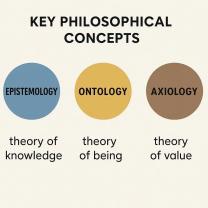What do philosophers of mind actually do?
Philosophers of mind are scholars who specialize in the philosophical subfield of philosophy of mind. Their work primarily revolves around the exploration, analysis, and investigation of fundamental questions related to the nature of the mind, consciousness, mental processes, and their relationship to the physical world. Here are some of the key activities and questions that philosophers of mind engage with:
1. Exploring the Nature of Consciousness:
- One of the central concerns in philosophy of mind is understanding consciousness. Philosophers of mind investigate questions like: What is consciousness? How does it arise? Can it be explained in purely physical terms, or does it have irreducible qualities?
2. Examining the Mind-Body Problem:
- Philosophers of mind grapple with the mind-body problem, which explores the relationship between mental states (such as thoughts, beliefs, and emotions) and physical states (such as brain processes). They consider various positions, including materialism, dualism, and various forms of monism, in attempting to explain this relationship.
3. Investigating Mental Representation:
- Philosophers explore how the mind represents information. Questions in this area include: How do mental states represent external objects and events? What is the nature of mental content and meaning?
4. Analyzing Mental Causation:
- The issue of mental causation deals with whether mental events can cause physical events and vice versa. Philosophers discuss the causal powers of mental states and their role in influencing behavior and the physical world.
5. Considering Qualia and Phenomenal Consciousness:
- Philosophers of mind study qualia, which are the subjective qualities of conscious experiences. They investigate questions like: What is it like to have a particular experience? How do qualia relate to physical brain processes?
6. Examining Mental States and Identity:
- Philosophers explore the nature of mental states and personal identity. Questions include: What constitutes a person's identity over time? How do mental states contribute to our sense of self?
7. Assessing Mental Disorders and Neuroscience:
- Some philosophers of mind engage in interdisciplinary work with psychology and neuroscience to better understand mental disorders, brain function, and the implications for our understanding of the mind.
8. Ethical and Practical Implications:
- Philosophers of mind often address ethical questions related to consciousness and mental states. For example, they may explore topics like the ethics of artificial intelligence, personal identity in the context of brain transplantation, and the moral implications of mental illness.
9. Examining Philosophical Traditions:
- Different philosophical traditions have contributed to the philosophy of mind. Philosophers may analyze and compare approaches from various traditions, such as analytic philosophy, continental philosophy, and Eastern philosophy.
In summary, philosophers of mind engage in a wide range of activities, including conceptual analysis, thought experiments, argumentation, and interdisciplinary collaboration, to tackle fundamental questions about the nature of the mind and consciousness. Their work has implications not only for philosophy but also for fields like psychology, neuroscience, cognitive science, and ethics.
The Role of Philosophers of Mind: Exploring Their Work
Philosophers of mind are concerned with the fundamental nature of the mind and its relationship to the body. They explore questions such as:
- What is consciousness?
- What is the relationship between mind and body?
- What is the nature of free will?
- What is the nature of mental states such as beliefs, desires, and emotions?
Philosophers of mind use a variety of methods to investigate these questions, including conceptual analysis, thought experiments, and arguments from intuition. They also draw on insights from other disciplines, such as psychology, neuroscience, and cognitive science.
Philosophy of Mind: What Philosophers in This Field Do
The work of philosophers of mind has important implications for our understanding of ourselves and the world around us. For example, their work on consciousness has helped us to better understand the nature of human experience and the role of consciousness in our lives.
Their work on free will has helped us to better understand the relationship between our choices and our actions. And their work on mental states has helped us to better understand how we think, feel, and interact with the world around us.
Philosophers of the Mind: Their Contributions and Research
Some of the most notable philosophers of mind include:
- René Descartes (1596-1650)
- John Locke (1632-1704)
- David Hume (1711-1776)
- Immanuel Kant (1724-1804)
- Gottfried Wilhelm Leibniz (1646-1716)
- John Stuart Mill (1806-1873)
- William James (1842-1910)
- Bertrand Russell (1872-1970)
- Ludwig Wittgenstein (1889-1951)
- Gilbert Ryle (1900-1976)
- Hilary Putnam (1926-2016)
- David Chalmers (born 1966)
- John Searle (born 1932)
These philosophers have made significant contributions to our understanding of the mind and its relationship to the body. Their work has helped us to better understand the nature of consciousness, free will, and mental states.
Philosophers of mind continue to explore new and challenging questions about the mind. Their work is essential to our understanding of ourselves and the world around us.











